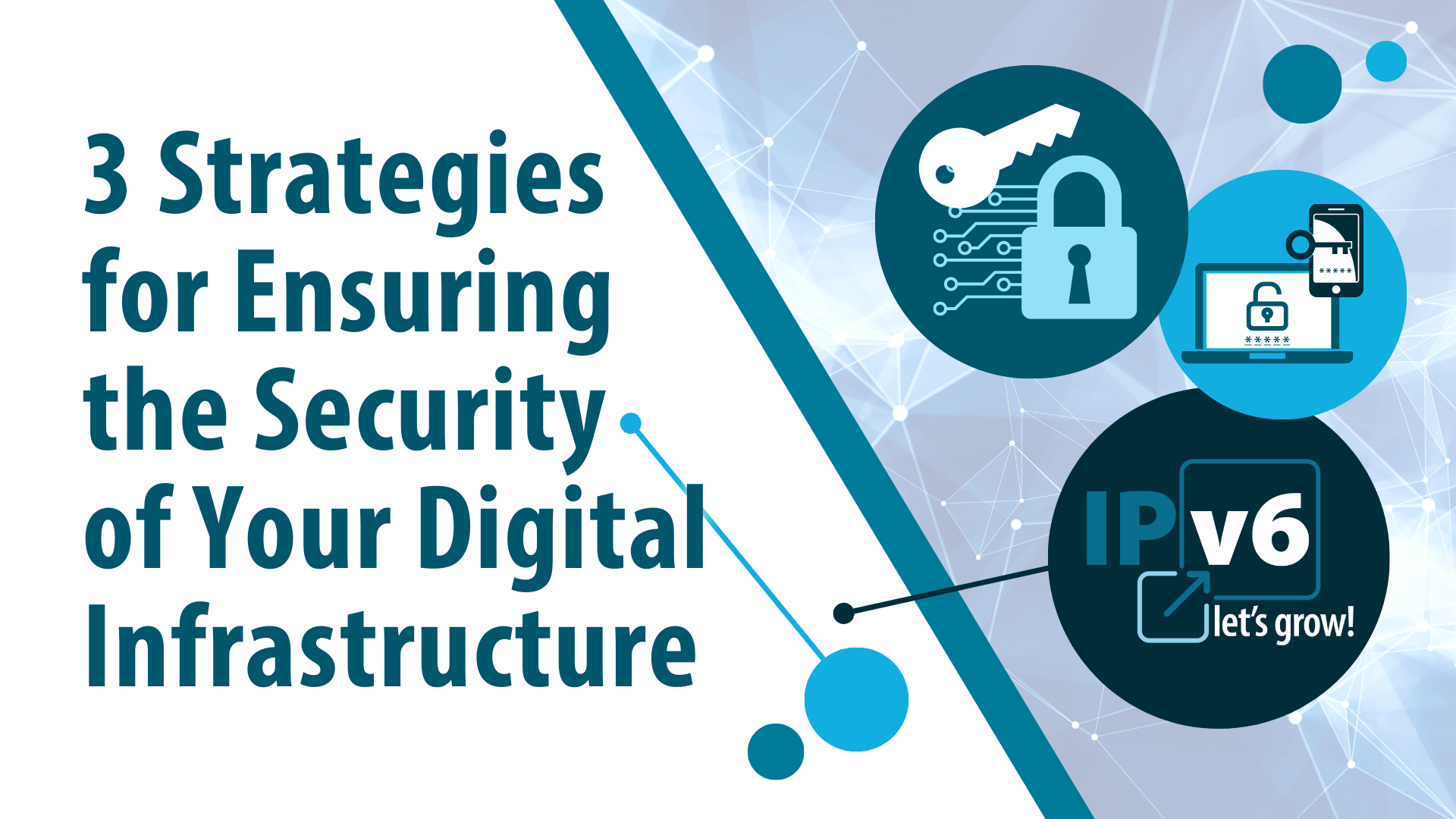
3 Strategies for Ensuring the Security of Your Digital Infrastructure
October is Cybersecurity Awareness Month, a time when we focus on safeguarding our digital assets. In today’s constantly evolving digital landscape, staying ahead of the curve is essential. To help you thrive in this environment, we have identified three key recommended steps to take: adopting Resource Public Key Infrastructure (RPKI); deploying IPv6; and implementing multifactor authentication (MFA). Read on for an overview of their benefits and resources to help you get started.
#1: Enhance Security with RPKI
Resource Public Key Infrastructure (RPKI) serves as a robust defense against malicious route hijacks and human error in the online realm. Imagine it as securing the roads to ensure the safe and unaltered passage of data traffic. RPKI accomplishes this by authenticating IP addresses and preventing unauthorized routing changes.
Key Benefits
- Route Hijack Prevention: RPKI validates routes, ensuring that your data traffic reaches its intended destination without unnecessary detours — and it reduces the overall attack surface for attempted hijacks on the greater Internet.
- Trustworthiness & Credibility: Implementing RPKI demonstrates your commitment to security, enhancing your organization’s trustworthiness in the eyes of clients and partners.
- Data Confidentiality: RPKI safeguards sensitive data from interception or redirection by unauthorized parties, ensuring data confidentiality.
- Business Continuity: Preventing unintentional disruptions caused by incorrect routing, RPKI safeguards your online operations, contributing to business continuity.
- Brand Reputation: RPKI ensures smooth user experiences, building trust and enhancing your brand’s image.
- Authority-Backed Security: RPKI services are provided and strongly encouraged by ARIN, a trusted and established member of the Internet resource management community.
For more information, check out ARIN’s comprehensive guide to RPKI.
#2: Embrace IPv6 for Future-Proofing
IPv6 represents the next generation of IP addresses and serves as your gateway to an Internet with ample room for expansion. Think of it as extending your network to accommodate a rapidly growing population of connected devices. IPv6 provides trillions upon trillions of unique addresses, ensuring everyone has the space they need.
Key Benefits:
- Address Exhaustion Solution: IPv6 alleviates the shortage of addresses caused by the depletion of the free IPv4 pools.
- Enhanced Security: IPv6 was designed with modern security measures like IPsec in mind, facilitating secure communications.
- IoT and Beyond: The virtually limitless pool of IPv6 addresses supports the proliferation of connected devices in the Internet of Things (IoT), from smart homes to wearable tech and beyond.
- Efficient Routing: IPv6 enhances Internet routing efficiency by reducing data congestion and boosting speed.
- Future-Proofing: As the Internet continues to expand, IPv6 ensures you’re prepared for the long term.
- Global Standard: IPv6 is globally recognized and proven, with continually expanding compatibility and seamless communication across networks.
To dive deeper, explore ARIN’s guide to IPv6.
#3: Protect Accounts with MFA
Multifactor authentication (MFA) acts as a robust defense against unauthorized access. By combining your password with unique, one-time codes, MFA ensures that only authorized users gain access to your accounts. ARIN requires all ARIN Online accounts to be protected with MFA, but it’s always worth revisiting your other Internet accounts to see how they can be secured.
Key Benefits:
- Password Weakness Mitigation: Even if your password is compromised, the second layer of authentication acts as a shield for your protected data.
- Data Confidentiality: MFA prevents unauthorized parties from gaining access to sensitive accounts, safeguarding your online assets.
- Elevated Security: An additional layer of security deters hackers and cybercriminals, ensuring the integrity of your data.
- Business Continuity: MFA protects business-critical information from breaches that can lead to downtime and reputation damage.
- User Trust: Implementing MFA signals to users that you prioritize their security, enhancing their trust in your services.
For more information, check out this article on LinkedIn: Two Factor Authentication(2FA) Clarified.
In Conclusion
In a world where technology continues to evolve, securing your digital assets has never been more vital. RPKI, IPv6, and MFA are powerful tools in this endeavor. While these strategies may initially appear complex or potentially not worth the investment, the rewards they offer are substantial. By implementing these recommendations, you are effectively future-proofing your digital infrastructure and ensuring your success in an ever-changing digital landscape.
Recent blogs categorized under: Security
GET THE LATEST!
Sign up to receive the latest news about ARIN and the most pressing issues facing the Internet community.
SIGN ME UP →Blog Categories
Updates • Public Policy • RPKI • ARIN Bits • Fellowship Program • Data Accuracy • Security • Tips • Caribbean • Grant Program • IPv6 • Business Case for IPv6 • Internet Governance • Elections • Outreach • Training • IPv4 • Customer Feedback • IRR


